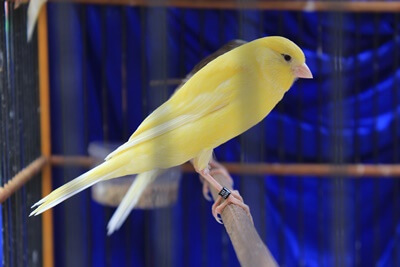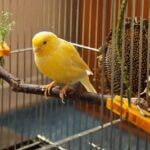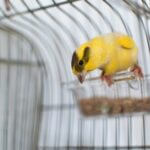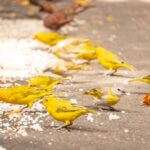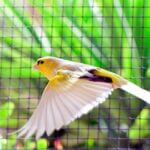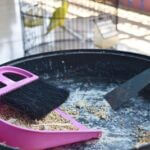A healthy canary should produce little-to-no odor. Unless you press your nose close to a canary, you may not detect any scent, which is true of most birds.
According to Biological Science, canaries don’t rely on scent as much as other domestic animals. So, there’s little need for canaries and other finches to produce strong smells.
In contrast, a mammal such as a ferret creates a more distinct odor because this is its way of communicating, interacting, and defending itself.
A clean and healthy canary should have a muted, unnoticeable smell. At worst, it may have a dry, dusty, or powdery smell, perhaps with musky undertones.
It’s usually due to feather dust and becomes more potent during the molting season.
Do Canaries Make Your House Smell?
Whether you have one bird or several in different cages, owning canaries indoors shouldn’t cause your home to smell differently from what it normally does.
You may notice a mild smell in the area directly around the cage, but it shouldn’t be strong or overwhelmingly unpleasant. If your whole house smells of your canary or its cage, there’s an issue with the habitat or the bird.
A strong smell could indicate an unchecked infection or illness. However, strong smells from the cage indicate that its living space needs to be cleaned more frequently.
If you clean the cage often, there’s likely a health problem giving it smelly feces. If the poop is foamy, the canary may have a clostridium infection.
Why Does My Canary Smell?
A canary’s feathers and the bedding used in its cage can soak up the scents in an environment.
A canary (and its cage) may smell bad for the following reasons:
Poor Hygiene
The most common cause of an unpleasant odor is poor hygiene due to the bird or its cage. You’ll notice a foul smell from the cage.
Unfortunately, a dirty cage will lead to a dirty canary. Over time, the smell will only get stronger, partly due to how a canary’s feathers take on environmental scents.
The most obvious cause is a build-up of fecal matter. Fresh canary feces shouldn’t have a strong smell if the bird is healthy, but it’ll produce an unpleasant odor over time.
As the fecal matter accumulates, it gathers bacteria, creating an unpleasant smell.
To limit the chance of a bad smell developing, you should remove feces and soiled material from the bottom of the cage several times a week.
Allow your canaries to bathe regularly. Your canary may try to bathe in its water dish, which can dirty its drinking water. At worst, it can also make the canary smell bad if the water isn’t changed regularly.
To stop that, provide a dedicated bathing dish with warm water every 2-3 days.
If you provide your canaries with wet, soft food, remove it at the end of each meal. This food will cause a strong smell if allowed to sit because it’ll go rotten.
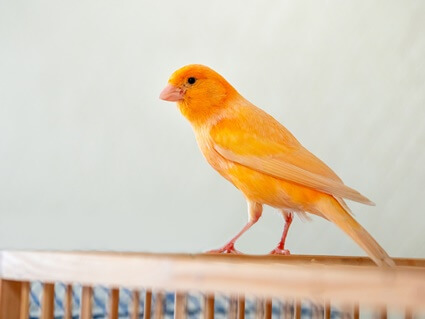
Infection and Illness
Animal Health found that certain bacterial and viral infections, alongside digestive issues, can cause foul-smelling diarrhea and abnormal fecal matter.
Healthy canary feces should be solid, liquid, and greenish or white. Very dark, watery, or dehydrated feces can indicate sickness. Abnormal feces will also smell different from healthy fecal matter.
Canaries are prone to necrosis, particularly in their feet. If necrotic (dead) tissue accumulates, it can lead to an unpleasant smell as the flesh decays.
Diet
What you feed your canary directly impacts its digestive system and fecal matter.
If your canary’s feces changes in texture and color or produces a strong smell after you change its diet, this could be due to issues with its dietary regimen.
For example, if a new food upsets its stomach, it could cause diarrhea.
How to Keep a Canary Clean
Cleanliness will enable your canary to remain clean and virtually odorless. The more often the canary can bathe, and the more frequently you clean its cage, the fewer issues you’ll encounter.
As a bonus, this will help your canary avoid illnesses, respiratory infections, bacterial infections, skin diseases, and other health issues.
Keeping your canary clean is a two-part process, which includes:
Cleaning the Cage
To assist with clean-up sessions, line the bottom of the cage with paper or another form of bedding.
This will absorb and localize the mess so that you can empty the newspaper or other material into the garbage can instead of needing to wash off and scrub the base pan every time.
At the end of each day, you should change the cage liner, empty old food, and water bowls, and clean the bowls before adding more. Likewise, wipe down any soiled surfaces, like bars or perches.
Sweep around the cage and clean up any droppings and food that have fallen outside of the cage. This will keep the enclosure hygienic and prevent nasty odors from entering your home.
For the best results, perform a deep clean of the cage structure once every 7-10 days.
This includes removing the canary from its enclosure, scrubbing down every part of the cage, and using bird-safe disinfectants that don’t produce toxic fumes (which can kill canaries).
Bathing Your Canary
Some canaries bathe in their water dish as and when they please, but this can be messy. Other canaries will wait until they’re provided with a larger bathing dish.
If you provide a bath, you should fill it with one inch of filtered, chlorine-free water. If your canary dislikes bathing, gently mist it with a spray bottle.
Whatever bathing method you use, let the canary dry in its own time in a warm, low-humidity room. Never use a hair dryer on your bird, as this can emit dangerous fumes, frighten it, or even burn it.
A canary’s scent is a helpful indicator of issues with its health, environment, or diet. If your canary smells bad or is stinking up your home, this is a reason to intervene.
It’s perfectly natural if your canary smells like nothing or produces a mildly dusty scent.

